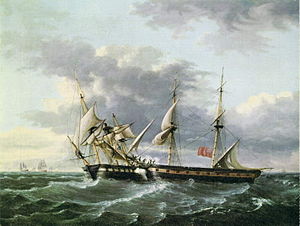HMS Frolic (1806)

USS Wasp boarding HMS Frolic, attributed to Thomas Birch, c. 1815
|
|
| History | |
|---|---|
|
|
|
| Builder: | Boole, Bridport |
| Launched: | 9 February 1806 |
| Honours and awards: |
|
| Captured: | 1812 (and recaptured) |
| Fate: | Broken up November 1813 |
| General characteristics | |
| Class and type: | 18-gun Cruizer-class brig-sloop |
| Tons burthen: | 384 bm |
| Length: |
|
| Beam: | 30 ft 6 in (9.3 m) |
| Depth of hold: | 12 ft 9 in (3.9 m) |
| Propulsion: | Sails |
| Sail plan: | Brig-sloop |
| Complement: | 121 |
| Armament: |
|
HMS Frolic was an 18-gun Cruizer-class brig-sloop of the Royal Navy. She was built by Boole, of Bridport and was launched on 9 February 1806. Although she took part in the capture of Martinique, Guadaloupe, and Saint Martin, she appears to have had an uneventful career until 8 October 1812, when the American sloop-of-war USS Wasp captured her after a fierce fight. Later that day the British recaptured Frolic and captured Wasp. Frolic was broken up in 1813.
On 26 October 1807, Tsar Alexander I of Russia declared war on Great Britain. The official news did not arrive there until 2 December, at which time the British declared an embargo on all Russian vessels in British ports. Frolic was one of some 70 vessels that shared in the seizure of the 44-gun Russian frigate Speshnoy (Speshnyy), then in Portsmouth harbour. The British seized the Russian storeship Wilhelmina (Vilghemina) at the same time. The Russian vessels were carrying the payroll for Vice-Admiral Dmitry Senyavin’s squadron in the Mediterranean.
Frolic, under Commander , sailed for the West Indies on 21 February 1808. There she participated in the Invasion of Martinique in February 1809, and then in the invasion of Guadeloupe. In 1847 the Admiralty authorized the issuance of the Naval General Service Medal with clasps "Martinique" and "Guadaloupe".
On 17 February 1810 Frolic, Surinam, and Superieure joined Captain William Charles Fahie of Abercrombie and his force at the surrender of Saint Martin.
On 14 June 1810, Frolic and Freya (or Freija) arrived at Sombrero Island in the West Indies. The Admiralty had sent them there to assess separately and independently the survival prospects for someone landed at this place without food and water. Captain Warwick Lake of Recruit had marooned an impressed seaman, Robert Jeffrey, there on 13 December 1807, and was now the subject of an Admiralty investigation. They reported back that survival prospects were poor. As it turned out, Jeffrey was alive, a passing American vessel having rescued him. Still, a court-martial dismissed Lake from the Royal Navy.
...
Wikipedia
